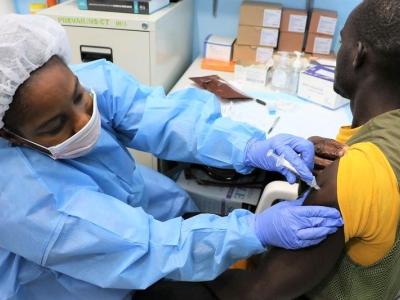Feb 24, 2009
WHO confirms Vietnam's recent H5N1 death
The World Health Organization (WHO) confirmed the death of a 23-year-old woman from H5N1 avian influenza. Her Feb 21 death raises the country's death toll to 53 among 109 cases, second only to Indonesia, which has 141 WHO-confirmed cases.
[Feb 24 WHO statement]
Groups urge Vietnam to boost bird flu fight
Vietnam should renew its vigilance against the H5N1 virus to prevent further spread in birds and humans, officials from the United Nations Food and Agriculture Organization (FAO) and the WHO said in a joint statement, according to a report today from Reuters. Since the first of the year, the country has had three illnesses and one death from the virus and reported poultry outbreaks in 10 provinces.
[Feb 24 Reuters story]
Bali reports another H5N1 outbreak
Animal health officials on the Indonesian island of Bali yesterday confirmed an H5N1 outbreak in cockfighting birds in the provincial capital Denpasar, the Jakarta Post reported today. Eight of the owner's 22 fighting cocks died suddenly, and the remaining 14 birds were culled to control the spread of the virus.
Marker may help speed human pandemic vaccine tests
Researchers have identified a marker that might help scientists assess the immune memory and persistence of prepandemic vaccines in humans in a few days instead of years. In a study sponsored by vaccine-maker Novartis and published online in the Proceedings of the National Academy of Sciences (PNAS), investigators found that an increase in the number of CD4+ T cells accurately predicted a rise in neutralizing antibodies after booster immunization and antibody maintenance 6 months later.
[Feb 23 PNAS abstract]
Baxter acknowledges H5N1-tainted lab samples
Officials from Baxter today responded to reports of influenza vaccine contaminated with the H5N1 virus that caused a scare at a Czech laboratory. Chris Bona, a Baxter spokesman, told Bloomberg News that the virus material sent to labs in three countries near its Austria headquarters was supposed to contain seasonal flu virus but was unintentionally contaminated with the H5N1 virus. The Czech lab workers discovered the error when inoculated ferrets died. So far, none of the workers have become ill.
[Feb 24 Bloomberg News story]
Study links low vitamin D levels to respiratory illness
People with the lowest blood levels of vitamin D report more upper-respiratory infections and flu, but the findings need to be confirmed in clinical trials before doctors can recommend it to boost immunity, researchers reported yesterday in the Feb 23 issue of Archives of Internal Medicine. Studying nearly 19,000 adults and adolescents, researchers found that the association between low vitamin D levels and respiratory illness held for all seasons and was even stronger in those with chronic lung diseases.
[Feb 23 Massachusetts General Hospital press release]
[Feb 23 Arch Intern Med abstract]
US vaccine practices committee meets this week
The federal Advisory Committee on Immunization Practices (ACIP) will meet in Atlanta Feb 25 and 26 to consider and make recommendations on issues concerning a number of vaccines, including those for anthrax and influenza. The panel, which advises the Centers for Disease Control and Prevention, will discuss a proposal to reduce the recommended number of doses of anthrax vaccine and change the route of administration. The group is also expected to make recommendations about flu vaccination for the 2009-10 flu season.


















